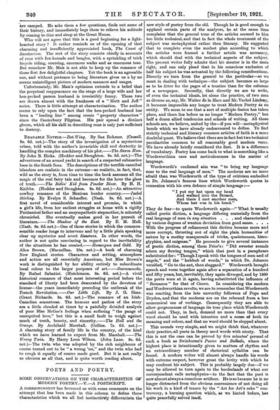READABLE NOVELS.—Bal-Wing. By Sax Rohmor. (Cassell. 8s. 6d. net.)—The story
of the investigation of a mysterious crime, told with the author's invariable skill and dexterity in handling the complex machinery of his plot.—The Storm Man. By John 13. Hicks. (Hodder and Stoughton. 8s. 6d. net.)—The adventures of an armed yacht in search of a suspected submarine base in the South Seas. The descriptions of the terrible cannibal islanders are realistic in the extreme—so realistic, in fact, that, wild as the story is, from time to time the book assumes all the magic of the real fairy tale and becomes for the hour the glass of truth. The Ridin' Kid from Powder River. By H. H. Knibbs. (Hodder and Stoughton. 8s. 6d. net.)—An attractive cowboy romance of the Mexican border country. Isabel Stirling. By Evelyn S. Schaeffer. (Nash. 8s. 6d. net.)—A first novel of considerable interest and promise, in which a girl's life, from her earliest struggles at home with a rigidly Puritanical father and an unsympathetic stepmother, is minutely chronicled. She eventually makes good in her pursuit of literature.—The Shadow of the East. By E. M. Hull. (Nash. 8s. 6d. net.)—One of those stories in which the common- sensible reader longs to intervene and by a little plain speaking clear up mysteries and avert disasters. In other words, the author is not quite convincing in regard to the inevitability of the situations he has created.—Homespun and Gold. By Alice Brown. (Macmillan. 10s. net.)—A book of charming New England stories. Characters and setting, atmosphere and action are all essentially American, but Miss Brown's work is distinguished by her ability entirely to subordinate local colour to the larger purposes of art•. Scaramouche. By Rafael Sabatini. (Hutchinson. 8s. 6d. net.)--A vivid historical romance of that most interesting period before the standard of liberty had been desecrated by the devotees of license—the years immediately preceding the outbreak of the French Revolution.---Our Little Life. By J. G. Sime. (Grant Richards. 8s. 6d. net.)—The romance of an Irish- Canadian seamstress. The humour and pathos of the story are a little clouded at times by a painfully detailed analysis of poor Miss McGee's feelings when suffering " the pangs of unrequited love," but this is a small fault to weigh against much of truth, beauty, and sincerity.—The Hall and the Grange. By Archibald Marshall. (Collins. 'is. 6d. net.)— A charming story of family life in the country, of the kind which we have learned to expect from Mr. Marshall.—The Wrong Twin. By Harry Leon Wilson. (John Lane. 8s. 6d. net.)—The twin who was adopted by the rich neighbours of course turned out to be " a wrong 'un," and the twin who had to rough it equally of course made good. But it is not really as obvious as all that, and is quite worth reading about.


































 Previous page
Previous page